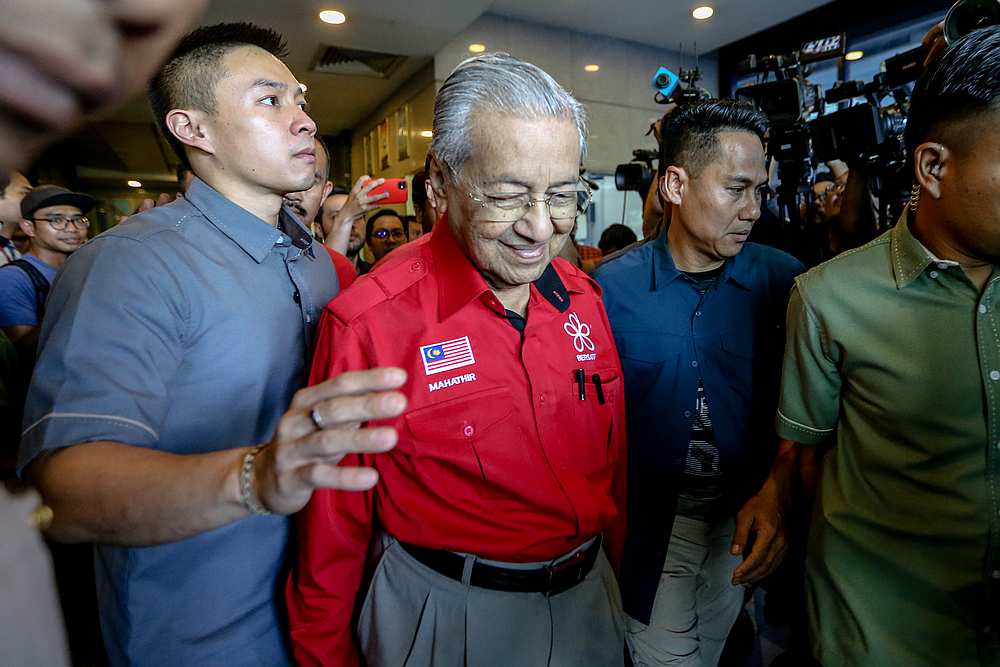COMMENTARY, Feb 29 — It was a week in which Tun Dr Mahathir Mohamad kept telling the truth and placed all his cards on the table.
Despite that, the public — perhaps in shock over his sudden resignation last Monday and the exit of Parti Pribumi Bersatu Malaysia from Pakatan Harapan — continued to doubt the elder statesman’s intentions.
To most, it seemed like a concerted attempt by Dr Mahathir to consolidate his position through an attempted power grab which sparked the week-long political turmoil.
From the very beginning, Dr Mahathir firmly said he would never work with the likes of Umno.
What logical sense is there for a elderly man who returned to the political fray from retirement in 2015, bent on toppling his former protege Datuk Seri Najib Razak, to “get in bed” with Umno now?
For a man so determined to remove Najib from office that he formed his own political party to do so, there is none.
“This election (GE14) is personal. I feel betrayed by him, I can’t help it. Najib cannot separate personal things from political workings,” Dr Mahathir once told a leading UK news outlet in 2018.
I was aged six when Dr Mahathir’s former deputy and protege Datuk Seri Anwar Ibrahim was sacked from Cabinet in 1998 and subsequently jailed for sodomy a year later under Dr Mahathir’s regime.
Too young to understand the consequence then of the fallout between Dr Mahathir and Anwar, of the Reformasi movement and the subsequent scepticism of working with a man who held onto power with an iron fist for 22 years as prime minister.
Perhaps since then, a distrust against Dr Mahathir has always there. For a man whose ambitions and political grudges came to influence every major power shift in the country for decades.
Throughout his career, Dr Mahathir has been held up as a hero or a villain and a cunning foe, depending on one’s own interests.
Or perhaps it was the widespread confusion and shock Malaysians felt that saw no takers for his non-partisan unity government idea.
To us, a “unity government” sounds like the rehashed autocratic ruling by one man that was not pragmatic and even undemocratic.
Fast forward to today, Bersatu president Tan Sri Muhyiddin Yassin is now set to take up the mantle of the 8th prime minister following the Yang di-Pertuan Agong’s announcement.
Apart from a looming Malay- and Bumiputera-centric government on the horizon with Muhyiddin’s coalition set to be sworn in tomorrow, much remains to be seen.
As senior Singapore Institute of International Affairs Fellow Oh Ei Sun puts it, Malaysians now can only hope good sense prevails.
“We can only appeal to the good sense of Muyhiddin such that he does not succumb to his racialist instincts (Malay first, Malaysian second) or give in too much to the predictably religiously extremist demands of PAS,” he told Malay Mail.
As a journalist tasked with the extensive coverage of Datuk Seri Najib Razak and a whole slew of other Umno politicians over the 1MDB scandal and other corruption scandals in the court, it also begs the question over the uncertainties of ongoing court cases.
Yet to summarise the entire political kerfuffle, Oh said it all began with Dr Mahathir refusing to let Anwar succeed him, which sent a signal to Muhyiddin’s allies to make their move.
“I won’t say instigated or orchestrated but it certainly gave some sort of passive approval to what went on last Sunday (Bersatu supreme council meeting).
“Things quickly got out of hand and now we have what is going on here,” he said.
For Oh, the show is not finished yet and hints of more political manoeuvring in the coming days.
Ultimately, it was the fact that Malaysia remains too deeply divided by race, religion, geography, class to see any other way forward for the country.
Even if, on hindsight, that non-partisan unity government idea was really not bad.





















